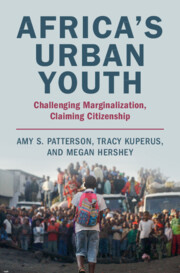Book contents
- Africa’s Urban Youth
- Africa’s Urban Youth
- Copyright page
- Dedication
- Contents
- Figures
- Tables
- Acknowledgments
- Abbreviations
- Introduction
- 1 Theorizing Urban Youth and Everyday Citizenship
- 2 Manifesting Citizenship through Local and Distinct Actions
- 3 Engaging the State
- 4 Confronting Economic Marginalization
- 5 Contesting Citizenship through Religious Identity
- 6 Affirming and Challenging Patriarchy
- 7 Channeling Frustration through Exit, Exclusion, and Engagement
- Conclusion
- Book part
- References
- Index
1 - Theorizing Urban Youth and Everyday Citizenship
Published online by Cambridge University Press: 10 August 2023
- Africa’s Urban Youth
- Africa’s Urban Youth
- Copyright page
- Dedication
- Contents
- Figures
- Tables
- Acknowledgments
- Abbreviations
- Introduction
- 1 Theorizing Urban Youth and Everyday Citizenship
- 2 Manifesting Citizenship through Local and Distinct Actions
- 3 Engaging the State
- 4 Confronting Economic Marginalization
- 5 Contesting Citizenship through Religious Identity
- 6 Affirming and Challenging Patriarchy
- 7 Channeling Frustration through Exit, Exclusion, and Engagement
- Conclusion
- Book part
- References
- Index
Summary
As a contested concept, “youth” is a chronological category and a socially constructed identity. African youth share socioeconomic and political constraints that delay adulthood markers and impact their views of citizenship. The meaning of “youth” is relational, set against assumptions about adulthood obligations, ties to elders, and youth’s own actions. Although youth is a liminal stage, youth are not passive; they improvise and engage their communities and countries through everyday citizenship. Recognizing how political life is abundant, everyday citizenship as a concept examines daily words and deeds of ordinary people who then shape identity and belonging in relation to others and the state. As a guiding principle distinguishable from nationalism (with its geographic component), civil society (with its organizational element), and social capital (with its roots in reciprocities), everyday citizenship pushes beyond rigid liberal and communal classifications to recognize how citizen identities and activities occur at multiple scales and sites, and through public and private practices. We examine various patterns of everyday citizenship in Ghana, Tanzania, and Uganda – countries representative of anglophone Africa but distinct in their regime types. The book’s multi-method, inductive approach uses Afrobarometer survey data, focus group discussions, interviews, and case studies to undergird its findings.
Keywords
- Type
- Chapter
- Information
- Africa's Urban YouthChallenging Marginalization, Claiming Citizenship, pp. 13 - 45Publisher: Cambridge University PressPrint publication year: 2023



